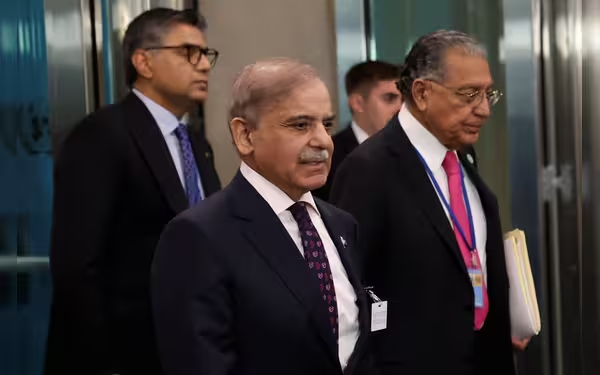Saturday, November 16, 2024 07:27 PM
Pakistan Secures IMF Support with Help from Saudi Arabia, UAE, and China
- Pakistan meets IMF conditions with international support.
- Prime Minister thanks Saudi Arabia, UAE, and China.
- Focus on structural reforms for economic stability.
 Image Credits: arabnewspk
Image Credits: arabnewspkPakistan thanks Saudi Arabia, UAE, and China for support as it meets IMF conditions for a $7 billion loan.
In a significant development for Pakistan's economy, Prime Minister Shehbaz Sharif announced on Wednesday that the country has successfully met the "tough conditions" set by the International Monetary Fund (IMF). This achievement comes with the crucial support of key allies, namely Saudi Arabia, the United Arab Emirates (UAE), and China. As the IMF board convenes to discuss a $7 billion loan program for Pakistan, the nation stands at a pivotal moment in its economic journey.
Back in July, Pakistan reached a staff-level agreement with the IMF for a fresh loan aimed at stabilizing its fragile economy. However, the path to securing this financial assistance has not been without challenges. Delays arose due to an external financing gap, prompting the government to seek commitments from its allies and request debt reprofiling. Finance Minister Muhammad Aurangzeb expressed optimism about finalizing the deal by the end of August, but the complexities of the situation required careful navigation.
On the sidelines of the 79th United Nations General Assembly Session in New York, Prime Minister Sharif expressed his gratitude towards Pakistan's "trusted brother nations"—Saudi Arabia, China, and the UAE. He stated, "Without their immense support, this would not have been possible." This acknowledgment highlights the importance of international partnerships in addressing economic challenges.
Particularly noteworthy is the role of China, which has historically supported Pakistan during critical times. The Prime Minister noted, "At the final stage, the conditions were related to China, and just like in the past, the Chinese government once again held Pakistan’s hand and offered immense support." This sentiment reflects the deep-rooted ties between the two nations and underscores the significance of collaborative efforts in overcoming economic hurdles.
Pakistan's previous $3 billion IMF program played a crucial role in averting a sovereign default in 2023, amidst a backdrop of declining foreign exchange reserves, currency depreciation, and soaring inflation. The government has maintained that macroeconomic indicators are showing signs of improvement, yet the need for a 37-month-long IMF program remains essential to solidify these gains.
As Finance Minister Aurangzeb stated, "You have to grow and build from a stable base." This statement encapsulates the essence of economic recovery—establishing a solid foundation is vital for sustainable growth. The government is now focused on moving forward with its reform agenda, which includes taxation, energy, state-owned enterprises, and privatization.
While the road ahead may still be fraught with challenges, the support from international allies and the commitment to structural reforms provide a glimmer of hope for Pakistan's economic future. As the nation navigates this critical juncture, it is imperative to remain steadfast in pursuing policies that foster stability and growth. The collaboration with global partners not only strengthens Pakistan's economic position but also reinforces the importance of unity in addressing shared challenges.













